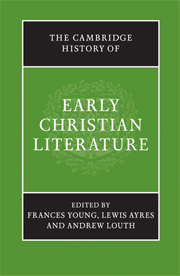Book contents
- Frontmatter
- PART ONE The Beginnings: The New Testament to Irenaeus
- PART TWO THE THIRD CENTURY
- A LITERARY GUIDE
- 11 The Alexandrians
- 12 The beginnings of Latin Christian literature
- 13 Hippolytus, Ps.-Hippolytus and the early canons
- 14 Cyprian and Novatian
- 15 The earliest Syriac literature
- 16 Concluding review: the literary culture of the third century
- B CONTEXT AND INTERPRETATION
- PART THREE FOUNDATION OF A NEW CULTURE: FROM DIOCLETIAN TO CYRIL
- Bibliographies
- Index
- Map: The Roman Empire in the late fourth century AD"
- References
12 - The beginnings of Latin Christian literature
from A - LITERARY GUIDE
Published online by Cambridge University Press: 28 March 2008
- Frontmatter
- PART ONE The Beginnings: The New Testament to Irenaeus
- PART TWO THE THIRD CENTURY
- A LITERARY GUIDE
- 11 The Alexandrians
- 12 The beginnings of Latin Christian literature
- 13 Hippolytus, Ps.-Hippolytus and the early canons
- 14 Cyprian and Novatian
- 15 The earliest Syriac literature
- 16 Concluding review: the literary culture of the third century
- B CONTEXT AND INTERPRETATION
- PART THREE FOUNDATION OF A NEW CULTURE: FROM DIOCLETIAN TO CYRIL
- Bibliographies
- Index
- Map: The Roman Empire in the late fourth century AD"
- References
Summary
The precise date and exact provenance of the emergence of Latin Christian literature are obscure. It seems to have appeared first in North Africa. Roman Christian literature is in Greek up to the time of Hippolytus in the mid-third century. Tertullian dominates the discussion because of the number of his extant treatises. He did not, however, like Athene, spring forth fully grown from the head of Zeus, armed and shouting his battle cry. There was a Latin Christian literature before him. Unfortunately, we cannot say how extensive this literature was, because its remains are so meagre.
The first Latin Christian literature appears to have been translations of portions of the Bible. These translations have not been preserved, but are posited from traces left in the biblical citations of Tertullian and Cyprian in North Africa, and Novatian in Rome. A distinction is made between ‘North African’ and ‘European’ translations on the basis of differences which appear in the authors from the respective locales. The earliest reference to such translations is in the Latin Acts of the martyrs of Scilli in North Africa (AD 180) where it is stated that the martyrs had copies of ‘books, and letters of Paul’. The former were probably copies of the Gospels. It is assumed that these books and letters would have been in Latin.
- Type
- Chapter
- Information
- The Cambridge History of Early Christian Literature , pp. 131 - 141Publisher: Cambridge University PressPrint publication year: 2004
References
- 5
- Cited by

